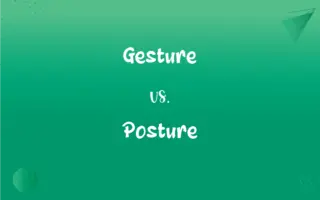Rebonding vs. Smoothing: What's the Difference?
Edited by Aimie Carlson || By Harlon Moss || Updated on October 25, 2023
Rebonding is a chemical hair treatment to make hair permanently straight, while smoothing is a milder treatment to reduce frizz and provide a naturally straight look.

Key Differences
Rebonding and smoothing are popular hair treatments, yet they serve different purposes. Rebonding is an intensive chemical process that changes the structure of hair to make it permanently straight. On the flip side, smoothing, though also a chemical process, is milder and aims to reduce frizz, providing hair with a naturally straight appearance.
The process of rebonding breaks the natural bonds of hair and restructures them to achieve straight hair. This treatment ensures pin-straight hair that remains consistent for months. In contrast, smoothing does not drastically alter hair bonds but gently works on the hair cuticle to offer a smoother and straighter appearance.
In terms of longevity, rebonding usually offers more permanent results and can keep hair straight for several months, depending on hair growth and care. Smoothing, being a milder treatment, often has shorter-lived results, necessitating more frequent visits to the salon to maintain the desired look.
The aftermath of rebonding often leaves the hair in a vulnerable state, requiring specific hair care products and routines to prevent damage. Smoothing, while still demanding post-treatment care, tends to be less demanding on the hair and allows for a bit more flexibility in hair care routines.
While both rebonding and smoothing provide a polished, straight look, the decision between the two often boils down to individual preferences and hair health. Those looking for a more permanent and intensely straight result may opt for rebonding, while those seeking natural straightness with reduced frizz might gravitate towards smoothing.
ADVERTISEMENT
Comparison Chart
Treatment Goal
Permanent straightening
Natural-looking straightening with reduced frizz
Intensity
Intense and deep chemical process
Milder chemical treatment
Effect on Hair Bonds
Breaks and restructures hair bonds
Gently affects hair cuticles
Longevity
Long-lasting results, several months
Shorter duration, often requires more frequent treatments
Aftercare Requirements
Demands specific products and care to prevent hair damage
Less strict post-treatment care
ADVERTISEMENT
Rebonding and Smoothing Definitions
Rebonding
A long-lasting solution to transform curly or wavy hair to straight.
To change her appearance for her new job, Elise opted for rebonding.
Smoothing
A treatment to reduce hair frizz and provide a naturally straight appearance.
Smoothing made Clara's hair manageable and free from daily straightening hassles.
Rebonding
The alteration of hair structure to achieve a pin-straight look.
Rebonding gave Lisa the straight hair she always dreamed of.
Smoothing
A mild chemical process offering a softer and frizz-free look.
After a smoothing treatment, Rebecca's hair looked naturally straight without any frizz.
Rebonding
A chemical process that permanently straightens hair.
After her rebonding treatment, Jenna's curly locks were transformed into sleek, straight strands.
Smoothing
A hair service aiming to enhance texture and reduce unruly curls.
Smoothing transformed Natalie's wavy hair into soft, straight locks.
Rebonding
An intensive hair treatment breaking and restructuring hair bonds.
Months after her rebonding session, Michelle's hair remained perfectly straight.
Smoothing
A technique to tame hair, giving it a straighter appearance without intense chemicals.
Smoothing allowed Hannah to retain some of her waves while achieving a polished look.
Rebonding
A permanent straightening method that uses chemicals to reconfigure hair bonds.
Rebonding provided Samantha with a dramatic change from her natural curls to straight tresses.
Smoothing
A gentler alternative to intense straightening, focusing on hair cuticles.
Preferring a natural look, Emma chose smoothing over rebonding.
Rebonding
Infl of rebond
Smoothing
Having a surface free from irregularities, roughness, or projections; even.
FAQs
Is smoothing suitable for all hair types?
Smoothing is generally suitable for most hair types, but it's best to consult a hairstylist.
Can smoothing damage hair?
While milder than rebonding, smoothing involves chemicals that, if not applied correctly, can cause hair damage.
How often should one undergo rebonding?
Typically, rebonding can last several months; however, it depends on hair growth and care.
Can smoothing and coloring be done simultaneously?
It's advisable to space out chemical treatments, so it's best to wait between smoothing and coloring.
Can I color my hair after rebonding?
Yes, but it's advised to wait a few weeks post-rebonding to prevent excessive hair damage.
Which treatment requires more aftercare: rebonding or smoothing?
Rebonding typically requires more intensive aftercare than smoothing.
How long does a rebonding session usually take?
A rebonding session can take anywhere from 3 to 8 hours, depending on hair length and thickness.
Can men undergo rebonding?
Absolutely, rebonding is suitable for anyone wishing to have permanently straight hair.
Does rebonding require specific aftercare products?
Yes, post-rebonding, using specific shampoos, conditioners, and serums can help maintain hair health.
Is it possible to retain some waves with smoothing?
Yes, smoothing can reduce frizz and give a naturally straight appearance without entirely eliminating waves.
Can I immediately wash my hair after a smoothing treatment?
It's often recommended to wait a couple of days after smoothing before washing the hair.
Is the rebonding process painful?
No, rebonding is not painful, but sitting for several hours might be uncomfortable for some.
Can rebonding cause hair fall?
If not done correctly or without proper aftercare, rebonding can lead to hair breakage or hair fall.
How long does the smoothing effect typically last?
Smoothing usually lasts a few months, depending on hair type and maintenance.
Does rebonding work on extremely curly hair?
Yes, rebonding can transform even extremely curly hair into straight strands.
How does smoothing affect hair health?
When done correctly, smoothing can enhance hair texture, but excessive treatments can lead to damage.
How soon can one undergo another rebonding session?
It's advised to wait until noticeable hair regrowth or until the previous rebonding effect wears off.
Is it possible to curl hair after smoothing?
Yes, hair remains adaptable to styling even after a smoothing treatment.
Which offers a more permanent result: rebonding or smoothing?
Rebonding offers a more permanent straightening result compared to smoothing.
Are there any natural alternatives to smoothing?
There are natural treatments, like hair masks and oils, that can reduce frizz but won't have as lasting an effect as chemical smoothing.
About Author
Written by
Harlon MossHarlon is a seasoned quality moderator and accomplished content writer for Difference Wiki. An alumnus of the prestigious University of California, he earned his degree in Computer Science. Leveraging his academic background, Harlon brings a meticulous and informed perspective to his work, ensuring content accuracy and excellence.
Edited by
Aimie CarlsonAimie Carlson, holding a master's degree in English literature, is a fervent English language enthusiast. She lends her writing talents to Difference Wiki, a prominent website that specializes in comparisons, offering readers insightful analyses that both captivate and inform.































































